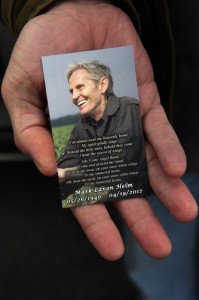Peopling the Americas, the Latest Chapter
As reported by Nicholas Wade in the NY Times, an extensive new genetic study may vindicate the assessment of the late linguist Joseph Greenberg that the Americas were peopled by three successive waves of early human migration from Siberia beginning around 15,000 years ago. The views of Greenberg—whom Wade calls “the great classifier of the world’s languages”– have been derided by some critics, though I’ve wondered if resistance to his theories has had more to do with pique at a linguist wandering off his turf on to other patches.
Today’s article is fascinating, as was an earlier piece on Greenberg that Wade published in 2000, a year before the Stanford linguist’s death at age 86. This man was a giant in the study of human languages.
If the new study reveals what its authors believe to be the case, the discoveries may bring new repute to the Clovis theory, that sees Siberian peoples coming to the Americas around 9000 B.C.E., 11,000 years ago, in three successive waves. By contrast, in 2004 I published a book by Canadian journalist Elaine Dewar, Bones: Discovering the First Americans, in which she suggested that the Americas may have been peopled from the south up, as it were, by migratory peoples who first made contact with the Americas along the Pacific coast of South America, like today’s Colombia, Ecuador, Peru, and Chile. Elaine was critical of Clovis and her book got serious reviews, like this one in Archaeology magazine. Not a scientist they say, but they forgive her for being a journalist.
The novelty of Greenberg’s theory was back in his core field, linguistics, with his central belief, based on his studies of vocabulary and speech patterns, that the peoples who came from Siberia brought with them two languages that then spawned all the languages spoken in the Americas, up to the arrival of European tongues in the 15th and 16th centuries. As Wade reports,
“[Greenberg] asserted in 1987 that most languages spoken in North and South America were derived from the single mother tongue of the first settlers from Siberia, which he called Amerind. Two later waves, he surmised, brought speakers of Eskimo-Aleut and of Na-Dene, the language family spoken by the Apache and Navajo.”
For balance, Wade finds scientists who don’t yet accept the interpretation of the study by its lead scientists:
“’This is a really important step forward but not the last word,’ said David Meltzer of Southern Methodist University, noting that many migrations may not yet have shown up in the genetic samples. Michael H. Crawford, an anthropologist at the University of Kansas, said the paucity of samples from North America and from coastal regions made it hard to claim a complete picture of early migrations has been attained. ‘Sometimes the statisticians make wonderful interpretations, but you have to be very guarded,’ he said.”
But Wade thinks skeptics can’t gainsay what amounts to a major validation of Greenberg:






